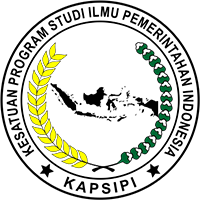Crossmark Policy
All Nakhoda: Jurnal Ilmu Pemerintahan (NJIP) articles are permanently published with a DOI and are accessible to the public. This applies regardless of the outcome of post-publication peer review.
All content, including articles that have not yet been peer-reviewed, is permanently archived in the NJIP OJS platform. All versions of articles that have been peer-reviewed will be archived on the NJIP Archive Page.
Authors may revise, change, and update their articles by publishing new versions, which are added to the article's history; however, versions cannot be changed or withdrawn once published, and are permanently available on the NJIP website. NJIP participates in the Crossmark scheme, a multi-publisher initiative that develops a standard way for readers to locate current editions of articles. By applying the Crossmark policies, NJIP is committed to maintaining the content it publishes and alerting readers to changes as and when they occur.
Clicking on the Crossmark logo (at the top of each NJIP article) will give you the current status of the article and direct you to the latest published version; it can also give you additional information, such as important dates for the article.
To maintain the integrity and integrity of scholarly records, the following policies will apply when corrections to published content are required; these policies take into account current best practices in the scholarly publishing and library communities:
Correction to an Article
In traditional journals, where articles are peer-reviewed prior to publication, corrections (or errata) are published to alert readers to inaccuracies in the article that arise after publication of the final article.
In contrast, NJIP articles are subject to peer review after publication and publication is not "final" as new versions may be added at any time. Any errors that come to light during the peer-review process can be highlighted in the published referee's report, which is part of the paper. Authors can post revised versions, and any errors that appear during peer review or later can be corrected by posting new versions. Corrections and changes from the previous version are always summarized in the "Amendments" section at the start of the new version.
Retraction
Articles may be retracted for a number of reasons, including:
- Honest errors reported by the authors (e.g., errors due to mix-up of samples or the use of scientific tools or equipment later found to be defective)
- Scientific misconduct (data falsification)
- Duplicate or overlapping publications
- Fraudulent use of data
- Explicit plagiarism
- Unethical research
For any retracted article, the reason for the retraction and the person who initiated the retraction will be clearly stated in the retraction notice. We will link to the retracted article on the site and mark it as retracted.
An article is usually retracted only at the request of the author or by the editor in response to an institutional scrutiny. In connection with NJIP's publishing model, it is important to note that, like in traditional journals, a retracted article is not unpublished or withdrawn so that it can be published elsewhere. The reasons for the retraction are usually so serious that the entire study or large parts of it cannot be included anywhere in the scientific literature.
The content of a retracted article would only be removed if legal restrictions were imposed on the publisher, copyright owner or author(s), for example if the article is clearly defamatory or infringes other legal rights, or if the article is the subject of a court order. In such cases, the bibliographic information for the article will be retained on the site, along with information about the circumstances that led to the removal of the content.
In rare cases, such as when incorrect or inaccurate data has been published which, if acted upon, poses a serious health risk, the original incorrect version(s) may be removed and a corrected version may be published. The reason for this partial removal is clearly stated in the latest version.
Editorial Note
If there is a potential unresolved issue with an article, it may be appropriate to alert readers to it with an editorial note. Such an editorial notice may be added, for example, when NJIP receives information that there may be research or publication errors, or that a serious dispute is arising between authors or between authors and third parties. The editorial note is normally published while further investigation takes place and until a more permanent solution is found (e.g., the publication of a revised, corrected version or a retraction).
Expression of Concern
On rare occasions, NJIP may choose to post a Statement of Concern associated with the problematic item when there are serious concerns about an item but there is no conclusive evidence that would clearly justify a retraction. This may include:
- if there is inconclusive evidence of misconduct in research or publication
- there is evidence that there is a problem with the article, but the author's organization will not investigate the incident
- an investigation into an alleged misconduct is not objective or conclusive




